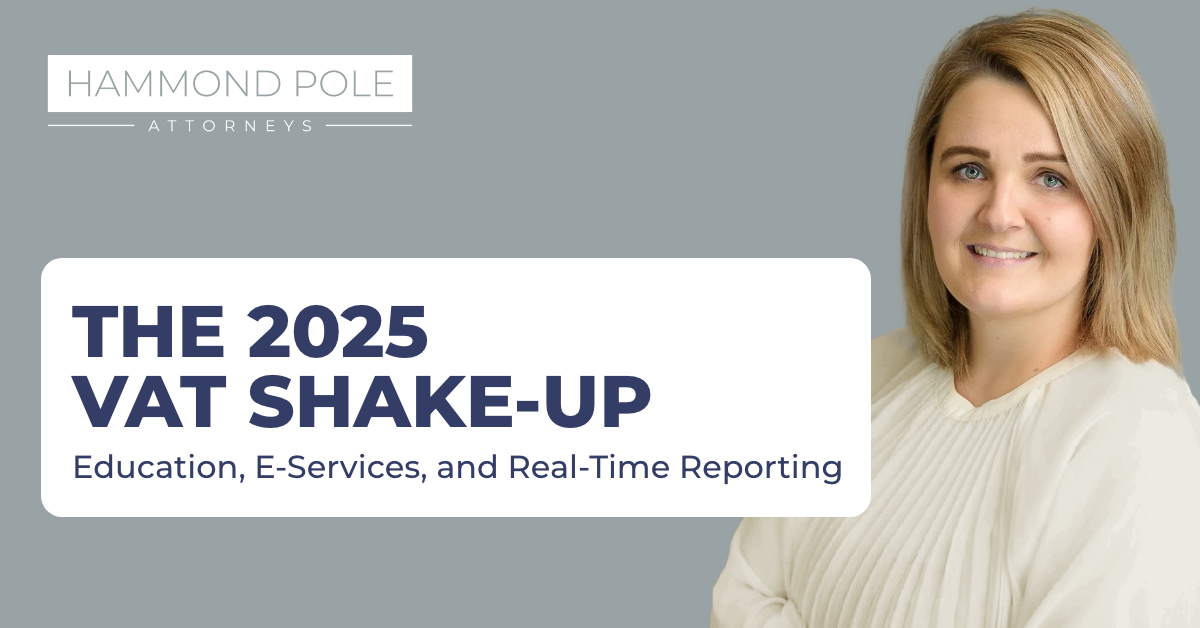The 2025 VAT Shake-Up: Education, E-Services, and Real-Time Reporting

Since the 2025 Taxation Laws Amendment Bill took effect on 1 April, South Africa’s VAT framework has undergone major changes. These reforms, combined with the South African Revenue Service’s (SARS) push towards modernisation, are reshaping compliance obligations across sectors. Schools, digital service providers, and businesses alike are already feeling the impact.
Broadening VAT Exemptions for Schools
One of the most significant reforms is the extension of VAT exemptions to all goods and services supplied by primary and secondary schools. This move removes schools from the VAT system entirely, aligning with government’s policy to reduce the administrative and financial burden on educational institutions.
How Have Schools Been Affected?
- VAT Deregistration: Schools that were VAT-registered have been compelled to deregister.
- Loss of Input VAT Claims: Deregistered schools can no longer claim input VAT on purchases, which has led to adjustments in budget planning for many of these institutions.
- Repayment of Input VAT on Assets: Any input VAT previously claimed on capital assets since registration must be repaid to SARS, posing financial challenges for administrators.
Key Takeaway: Schools need proactive financial planning to manage deregistration, clawbacks, and loss of input VAT recovery.
Redefining “Electronic Services” in a Digital Economy
With effect from 1 April, the updated definition of “electronic services” under the VAT Act has expanded SARS’ reach into the digital economy. Businesses providing cross-border electronic services now form part of the VAT net, which has led to heightened compliance requirements for service providers.
Key Considerations for Businesses:
- Reviewing and updating VAT registrations under the broader definition.
- Ensuring accurate tax collection and submission for cross-border services.
- Adjusting to the increased administrative obligations resulting from the legislative changes.
Key Takeaway: Businesses offering electronic services must review structures, update processes, and prioritise VAT compliance.
Modernisation of VAT Submissions
SARS’ modernisation drive has accelerated in 2025, with real-time VAT reporting now becoming increasingly integral to compliance. Businesses must now ensure readiness for:
- Real-Time Data Submission: Providing VAT data to SARS in real-time or near real-time.
- Improved VAT Return Systems: Adapting operational processes to fit the modern VAT return structure, which prioritises accuracy and transparency in submissions.
Key Takeaway: Companies need updated systems and processes to meet SARS’ real-time reporting demands.
What This Means Going Forward
With the reforms now fully in effect, their practical implications are clear.
- Schools are grappling with deregistration and VAT clawbacks.
- Digital businesses face tighter VAT compliance obligations.
- All VAT-registered entities must align with SARS’ modernisation drive.
Key Takeaway: Proactive advisory and tailored compliance strategies are critical to navigating the 2025 VAT changes.
How Hammond Pole Can Help
At Hammond Pole, we provide tax and legal guidance to help clients adapt to the evolving VAT landscape. Whether you are:
- A school managing VAT clawbacks and budget shifts,
- A digital business navigating the expanded definition of electronic services, or
- A company preparing for SARS’ real-time reporting requirements,
our team is here to ensure you remain compliant while minimising disruption.
The VAT environment is becoming increasingly dynamic, having experienced legal and tax advisors at your side has never been more critical.
If you’d like to review your compliance strategy or need support with the 2025 VAT changes, contact Hammond Pole today.

